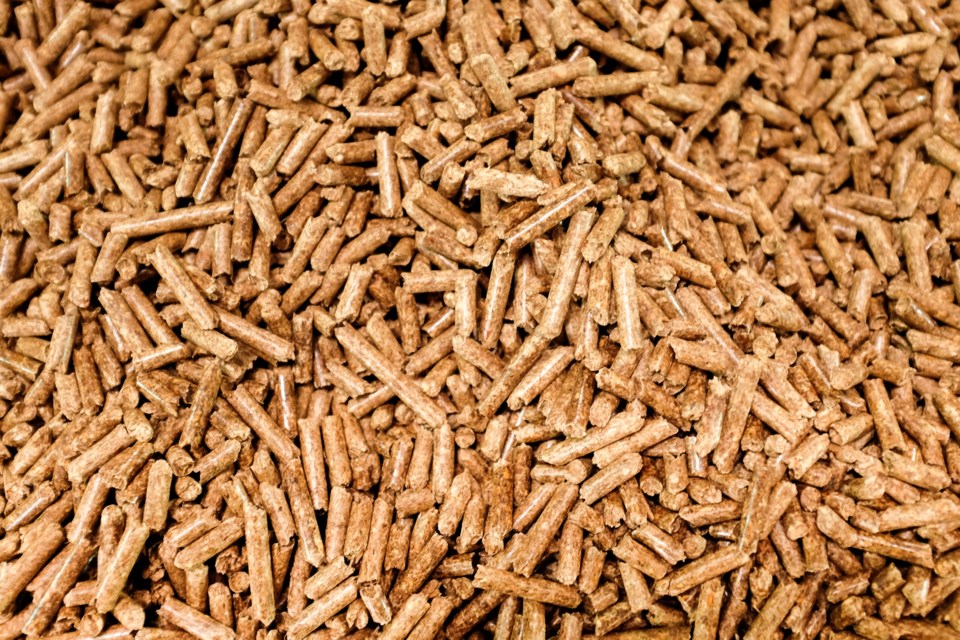The federal Competition Bureau is being called upon to investigate the "dominant position" a company has taken in the wood pellet industry in Western Canada.
In a letter sent to the bureau this week, a group representing two unions, an environmental group and a public policy organization claims Drax has come to monopolize much of the wood pellet product in British Columbia and Alberta and lessen competition in the process.
Drax is based in the United Kingdom where it operates a thermal electricity plant fuelled almost exclusively by wood pellets and is the "largest of its kind in the world," according to the group.
Due to a lack of forest cover in the United Kingdom, Drax has had to turn to Canada and the U.S. southwest for supply, the group says.
They say that with the purchase of Pinnacle Renewable Energy Inc. in April 2021, Drax gained whole or partial ownership of seven of the 14 pellet plants that operate in B.C., amounting to 62 per cent of the industry's output in the province.
However, the group says Drax's subsequent purchase of sales contracts held by Pacific Bioenergy in December 2021 is what prompted the request to the Competition Bureau, saying it has given the company control over more than two-thirds of B.C.'s output.
As well, they also noted that Pacific Bioenergy will be shutting down its operations in March "at a cost of 55 manufacturing jobs and an undisclosed number of logging and log hauling jobs."
The group also worries that Drax will have its eyes on securing supply from a pellet plant in the process of being established in Fort Nelson. If built, it will have an output "far surpassing anything currently in operation in the province" and will rely on turning whole trees into chips.
"This would mark a radical departure from what the pellet mills in the province were originally built to process, which was the so-called wood waste or 'residuals' in the form of wood chips generated at sawmills when round logs were turned into rectangular lumber products," the group says.
As for Alberta, they estimate that Drax controls 82 per cent of that province's total and 44 per cent of output in Canada as a whole.
"We urge you to investigate whether such a level of concentration serves the interest of Canadians, and if it does not whether Drax should be ordered to divest itself of certain assets," the groups says.
The letter is signed by Gary Fiege, president of the Public and Private Workers of Canada, which represents workers at Pacific Bionergy, Scott Doherty, executive assistant to Unifor's national president, Michelle Connolly, a director with Prince George-based environmental advocacy group Conservation North and Ben Parfitt, a resource policy analyst with the Canadian Centre for Policy Alternatives.
Responding to a request for comment, a Drax spokesperson said the company is "investing in B.C.’s pellet mills, sustaining and creating jobs, investing in safety and providing clean growth opportunities in the communities where we operate.
"We are fully committed to sustainability and today the residuals from BC's forest sector are playing a key role in supporting efforts to displace coal from power systems and helping to meet global climate targets.”
Gordon Murray, executive director of the Wood Pellet Association of Canada said the past decade has been challenging for the BC forest sector and significant investment has left the province.
"As such WPAC and its members welcome investment in the pellet sector by companies like Drax that share our commitment to leading standards in safety, resilient communities, and responsible sourcing that ensures trees go to their highest and best use," Murray said.
A spokesperson for the Competition Bureau confirmed the letter has been received and added the agency "must complete a thorough examination of the facts to determine if an investigation is warranted."
In November, the Competition Bureau found pulp and paper manufacturer Paper Excellence's $3 billion acquisition of Domtar would result in the merged companies owning 70 per cent of the Thompson-Okanagan wood fibre supply.
As a result, Paper Excellence agreed to sell a Domtar pulp mill in Kamloops to a third party.
- with files from Nelson Bennett, Glacier Media



